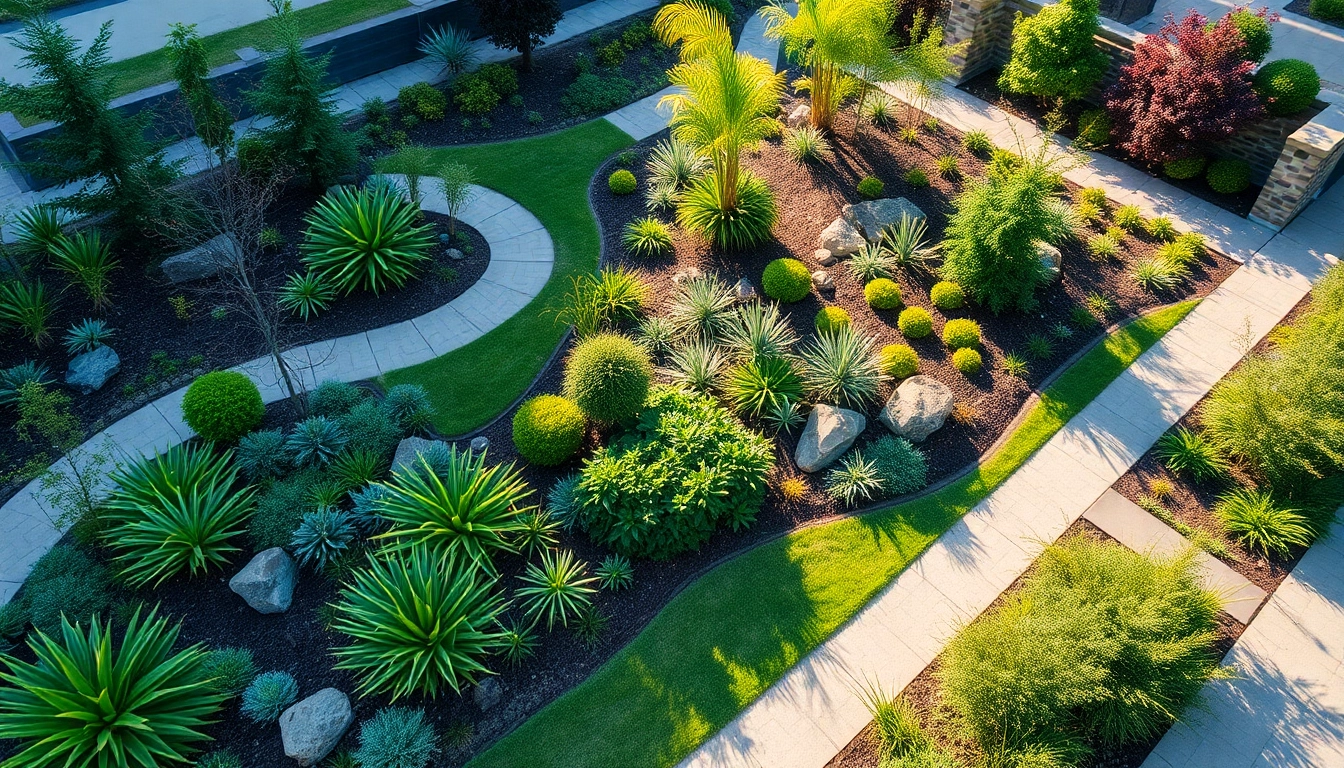Understanding the Role of Commercial Landscaping Contractors
What Do Commercial Landscaping Contractors Do?
Commercial landscaping contractors play a vital role in the enhancement and maintenance of outdoor spaces. Their responsibilities extend beyond mere aesthetics; they are essential in creating environments that are both functional and inviting. Engaging a professional means you have access to a range of services designed to meet the unique needs of businesses.
Typically, these contractors design, install, and maintain landscaping projects that cater to commercial properties, parks, corporate venues, and municipal spaces. Duties often include:
- Design: Crafting appealing landscapes which might include lawns, flower beds, shrubs, trees, walkways, and water features.
- Installation: Executing the design plan by planting, constructing features, and implementing irrigation systems.
- Maintenance: Offering ongoing care for the landscaping elements, including mowing, pruning, fertilizing, and pest control.
- Consultation: Providing expert advice on plant selection, sustainability practices, and seasonal landscaping changes.
Importance of Professional Landscaping for Businesses
Investing in professional landscaping can yield significant benefits for businesses. A well-maintained landscape not only enhances curb appeal but also improves the overall environment for employees and clients alike. Key advantages include:
- Brand Image: The appearance of your property reflects your company’s image. Attractive landscaping fosters a positive perception and conveys professionalism.
- Employee Productivity: Well-designed green spaces can boost employee morale and productivity by offering a pleasant place to work and relax.
- Customer Attraction: A visually pleasing property is more likely to attract customers. Landscaping directly influences foot traffic.
- Environmental Benefits: Sustainable landscaping practices help reduce urban heat, improve air quality, and conserve water, aligning business practices with eco-friendly values.
Identifying Qualities of Top Contractors
In your search for the right commercial landscaping contractor, certain qualities can indicate their capability and reliability. A top contractor will possess:
- Experience: A proven track record in handling commercial projects similar to your needs is invaluable.
- Skills & Certifications: Relevant training and certifications, along with technical skills, ensure they can tackle various landscaping challenges.
- Portfolio: A diverse and impressive portfolio showcasing past work provides insights into their aesthetic sensibilities and project management skills.
- Client Reviews: Positive testimonials and reviews can be strong indicators of customer satisfaction and project success.
- Strong Communication: Effective communication is key to understanding your vision and executing it correctly.
Choosing the Right Commercial Landscaping Contractor
Factors to Consider in Your Selection Process
Choosing a commercial landscaping contractor is a significant decision that impacts your business environment. Here are some essential factors to consider:
- Services Offered: Ensure the contractor provides comprehensive services, including design, installation, and maintenance.
- Location: Local contractors will have a better understanding of your area’s climate and soil conditions, which can influence the success of your landscaping.
- Costs: Obtain detailed estimates and compare them, keeping in mind that the cheapest option may not always be the best. Consider value for money and the quality of materials used.
- Insurance and Liabilities: Confirm that the contractor has liability insurance and workers’ compensation coverage to protect your business.
Budgeting for Commercial Landscaping Projects
Establishing a clear budget for your landscaping project is critical. Start by determining your goals and how much you are willing to invest. Consider the following:
- Initial Setup Costs: This includes design, installation, soil preparation, plant materials, and irrigation systems.
- Maintenance Costs: Ongoing costs for regular upkeep, which may include mowing, pruning, fertilization, and pest control.
- Seasonal Variations: Be prepared for fluctuating costs throughout the year, as certain seasons may require more attention and resources.
- Contingency Funds: Allocate a portion of your budget for unforeseen expenses that may arise during the project.
Questions to Ask Potential Contractors
When interviewing potential contractors, asking the right questions can provide valuable insights into their capabilities. Consider these questions:
- What is your experience with similar projects? Understanding their previous work can help gauge their suitability for your needs.
- Can you provide references? Speaking to past clients can reveal important information about their reliability and quality of work.
- What is your design process? Knowing their approach will help you understand how they interpret your vision.
- What types of plants and materials do you recommend? Insights into their choices can reflect their knowledge and fit with your aesthetic preferences.
Design Ideas from Leading Commercial Landscaping Contractors
Creating Functional Outdoor Spaces
Designing functional outdoor spaces is essential for maximizing the usability of commercial properties. Here are some ideas:
- Outdoor Seating Areas: Create inviting spots for employees and visitors, furnished with durable seating and shaded areas.
- Walkways and Paths: Establish clear and accessible pathways to guide foot traffic and enhance safety on large properties.
- Multi-Use Open Spaces: Designate areas for events, community gatherings, or outdoor meetings, supporting diverse activities.
- Water Features: Incorporating ponds, fountains, or other water features can enhance the tranquility of outdoor areas.
Sustainable Landscaping Solutions
Adopting sustainable landscaping practices is increasingly important for businesses looking to reduce their environmental footprints. Some effective strategies include:
- Native Plants: Utilizing local flora requires less water and maintenance, while they continue to thrive in local climates.
- Rain Gardens: Installing rain gardens to manage stormwater runoff helps to filter pollutants and reduce erosion.
- Efficient Irrigation Systems: Implementing smart irrigation systems minimizes water use through timers and sensor technology.
- Permeable Paving: Using permeable hardscapes allows for natural water infiltration and helps prevent puddling.
Seasonal Planting Strategies for Year-Round Appeal
To maintain an inviting landscape throughout the year, consider these seasonal planting strategies:
- Spring: Introduce colorful annuals and perennials to kick-start growth after winter.
- Summer: Choose drought-tolerant plants that thrive in the heat and require less maintenance.
- Fall: Incorporate ornamental grasses and seasonal flowers to keep your landscape vibrant as the weather cools.
- Winter: Focus on evergreens and structural elements that provide visual interest and support during colder months.
Common Challenges with Commercial Landscaping Projects
Managing Client Expectations
Setting clear and realistic expectations is a challenge faced by many landscaping contractors. To mitigate potential issues, consider the following strategies:
- Communicate Transparently: Discuss timelines, costs, and possible complications openly.
- Set Achievable Goals: Reinforce achievable outcomes to avoid disappointment.
- Regular Updates: Provide clients with progress reports to maintain engagement and trust.
- Visual Aids: Use sketches, renderings, or model presentations to help clients visualize the project.
Addressing Local Environmental Considerations
Local environmental conditions can significantly impact landscaping outcomes. Be mindful of factors such as:
- Soil Quality: Conduct soil tests to determine its composition and amend it accordingly for optimal plant growth.
- Climate: Choose plants suited for the local climate to enhance resilience and reduce maintenance needs.
- Pest Management: Prepare an appropriate pest management strategy considering local pest populations and their life cycles.
- Flood Risk Areas: Assess flood zones to ensure designs mitigate risks through proper drainage solutions.
Overcoming Budgetary Restrictions
Budget constraints can restrict the scope and quality of landscaping projects. Here are several ways to manage budgetary challenges effectively:
- Prioritize Essential Elements: Identify critical areas that will yield the highest impact on your property.
- Incremental Implementation: Consider phased approaches to spread costs over time while still achieving landscaping goals.
- Explore Grants and Financing Options: Investigate potential funding opportunities for sustainable landscaping efforts that may be available.
- DIY Elements: Engage in some tasks yourself, such as planting or design tweaks, to save on labor costs.
Measuring the Impact of Professional Landscaping
Visual Appeal and Business Image
The immediate visual impact of landscaping can dramatically alter the perception of a business. Well-designed surroundings not only attract attention but also foster trust and credibility. Studies indicate that businesses with attractive landscaping initiatives tend to enjoy improved customer loyalty and brand recognition.
The Role of Landscaping in Client Traffic
Landscaping is not just about aesthetics; it plays a crucial role in attracting clients. Properties with inviting and well-maintained landscapes experience higher foot traffic, translating into increased sales opportunities. A welcoming entrance, vibrant flora, and organized layouts contribute to an environment that draws customers in.
Evaluating ROI from Landscaping Investments
To determine the return on investment (ROI) from landscaping projects, businesses should consider various metrics:
- Property Value Increase: Well-executed landscaping can raise property values significantly, making it an asset in real estate terms.
- Reduced Energy Costs: Strategically placed trees and shrubs can lower cooling costs in summer, providing long-term savings.
- Increased Business Revenue: More attractive properties frequently lead to higher sales and customer retention rates.
- Cost Savings from Reduced Maintenance: Using native plants and sustainable practices can decrease ongoing maintenance costs over time.



